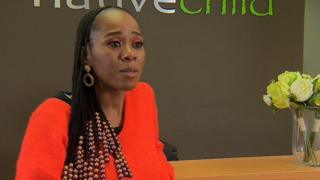Coronavirus: How African firms are adapting to the pandemic

The coronavirus pandemic has brought doom and gloom to many businesses globally, whether big or small, and it looks like there will be more difficult times ahead as governments grapple with the worst economic downturn since the Great Depression.
But while some firms are sinking and may not reopen again, others have so far been able to swim with the tide.
Amidst store closures, job cuts and tensions with commercial property landlords, some entrepreneurs in Africa have been able to take the pandemic in their stride and capitalise on changing consumer demands.
Here are three firms in different industries from across the continent that still hold hope for the future.
Hair and skincare in South Africa
In recent years, the growing middle class of Africans has led to the realisation that there is a need for customised products that cater specifically to African consumer needs.
The African beauty industry is burgeoning as an increasing number of entrepreneurs are developing product ranges to suit African body types.
One such example is Native Child, a South African hair and body care brand that uses only natural ingredients, which was founded by quantity surveyor Sonto Pooe in 2015 from her kitchen.
The business had been growing at a steady pace, but the coronavirus lockdown measures mandated by the government caused retail sales to plunge and the cost of procuring crucial supplies to soar, impacted by the falling South African rand.
Fortunately Ms Pooe’s business has been allowed to stay open as it was classed as an essential service, so she and her team began problem-solving their way past a myriad of challenges.
Parcels are still being dispatched to customers, and because many retailers have closed, Native Child gained many new customers online from across the continent.
However this brought more problems, as the firm then found it was struggling to keep up with demand. It had to keep working out solutions to supply chain problems, as it became too expensive and too difficult to import some raw materials.
«There’s a particular product that we use in one of our formulations, which is a blend [of several] raw materials to make one final product. We’ve had to create a blend ourselves, instead of buying it already premixed…to kind of make sure that production still continues,» Ms Pooe tells the BBC.
Due to the lockdown, the ecommerce side of Native Child’s business has taken off so much that Ms Pooe is having to outsource the running of the website entirely to another firm, as there is now more work than Native Child can handle.
E-learning in Nigeria
Gradely is a Nigerian technology startup founded in August 2019. The firm has a personalised e-learning platform for children that uses artificial intelligence to assess pupils’ strengths and weaknesses.
Schools in 144 countries remain closed and parents are having to pull double duty as both bread winners and teachers.
While the platform is still in its first year of operation, the coronavirus lockdown has served to accelerate the start-up’s progress in developing the product, as frazzled Nigerian parents turned online for support.
«Gradely has been highlighted during the pandemic. People now come to find us and there’s been a huge spike in demand, but it’s also put us in a place where we need to show and prove the power of technology,» says Boye Oshinaga, founder and chief executive of Gradely.
Because the platform uses artificial intelligence, the system is always learning, and over time it is gathering valuable data about how children learn and the areas where they struggle.
Parent Chinyere Ogunbi tells the BBC that she had been struggling to find enough work and material to give her son to do.
«Gradely had a wider base where they test the child, identify areas where we need help and focus on those areas,» she says. «That means I don’t need to sit with him [all the time] – he can get onto the platform, do what he needs to do, and I get feedback on his progress.»
Mr Oshinaga strongly believes that personalised learning is the future of education: «Parents are using us on a daily basis and we’re already tracking how much improvement children are making over a month or two, so we can show the world that this is not just technology for technology’s sake – it can make a real difference in every child’s learning.»
Securing funding for healthcare infrastructure
Africa Finance Corporation (AFC) is a pan-African investment grade multilateral finance institution that is run by sovereign African states.
It typically focuses on addressing infrastructure shortfalls and garnering investments to enable economic development, and in recent years transport and communication have been high priorities.
The firm is based in Lagos, Nigeria, but it also works across the continent, with at least half of its staff travelling all the time. The coronavirus lockdown measures imposed by many governments have put a stop to this, and the firm has had to completely transform the way it works so that all staff can work seamlessly at home.
The firm has also switched its focus towards improving health infrastructure, by securing funding to quickly build hospitals.
So far through lockdown, AFC has built an emergency 110-bed hospital in Lagos, as well as a 340-bed hospital in in Abuja, the federal capital of Nigeria.
The firm has also secured financial aid for five African states and is now working to extend that to another 10 African nations.
«We’re looking at what kind of development support solutions we can provide to enhance the capacity of the healthcare delivery system on the continent and to generally cope with liquidity and the sovereignty challenges that we know most of our institutions will face on the continent,» AFC chief executive Samaila Zubairu tells the BBC.
He added that the financial industry is hoping that the coronavirus crisis will «turn into some sort of advantage and wake up call for the continent» that will inspire African nations and entrepreneurs to bring production centres and manufacturing activities «closer» to home.
«The crisis has revealed a lot of well-known structural deficiencies in the way African economies are set up and the way we trade with the rest of the world,» he stresses, explaining that a lot of money is spent by African nations to export basic commodities to other countries where production takes place, and then more money is spent importing the goods back into Africa.
«We have the continental free trade agreement coming in force soon – we need to take advantage of this pandemic, not to waste this crisis, to make sure that we have production centres [where] we produce at least 30-40% of what is required for us to trade within ourselves on the continent, and then we continue to build on that going forward.»
You can tune into In Business Africa every Friday at 18:30 GMT on BBC World News.

